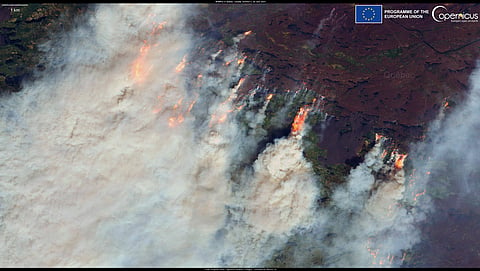

A new study reveals that the 2023 Canadian wildfires, which burned 18 million hectares, released toxic smoke that impacted air quality across North America and Europe, contributing to an estimated 82,000 premature deaths.
The unprecedented fires, fueled by climate change, exposed 354 million people to harmful PM2.5 pollutants, fine particles that penetrate the bloodstream and increase risks of chronic illnesses.
The research, published in Nature, highlights the far-reaching consequences of extreme wildfires.
The wildfires’ smoke traveled thousands of miles, degrading air quality far beyond Canada’s borders.
In North America, 41,900 chronic deaths were linked to prolonged exposure to polluted air, while Europe saw 22,400 deaths from similar causes.
Acute exposure during intense “smoke days” led to 4,100 deaths in the U.S. and 1,300 in Canada.
“These results underscore that such extreme wildfires are no longer just a regional environmental issue,” said Qiang Zhang, lead researcher from Tsinghua University, emphasizing their global public health impact.
The human toll is exemplified by the death of nine-year-old Carter Vigh in British Columbia, whose asthma attack, aggravated by wildfire smoke, proved fatal despite precautions.
His mother, Amber Vigh, has since partnered with the BC Lung Foundation to distribute air quality monitors, addressing gaps in local pollution detection.
The study notes limitations, as wildfire-specific health impacts are underexplored, and PM2.5 from fires may be more toxic than other sources, potentially underestimating the true death toll.
As climate change intensifies wildfires, their smoke poses an increasing threat to human health.
In Canada, PM2.5 exposure rose by 65%, while the U.S. and Europe saw increases of 21% and 4%, respectively.
Experts like Cathryn Tonne from ISGlobal warn that the study’s estimates may be conservative, given emerging evidence of wildfire smoke’s heightened toxicity.
Initiatives like Vigh’s aim to raise awareness and improve monitoring to prevent future tragedies.